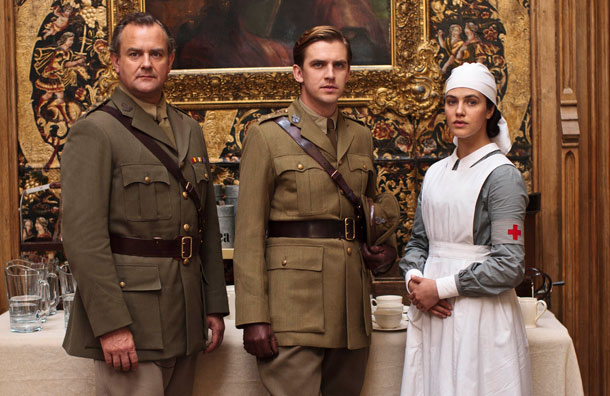Our son Isaac and daughter-in-law Rebekah don't own a television, which I think makes them honorary Amish people. They do watch TV series on their computer but they are quaintly out of sync with the rest of the viewing world. On the weekend Ike texted that they had just finished season one of Downton Abbey and mentioned what I had forgotten, that it concluded with the announcement of the beginning of World War One. Go figure. They were so out of touch that they were entirely topical with the hundredth anniversary of The War to End All Wars coinciding with their episode.
I spoke about chaplaincy during WW1 on the Canada Day weekend and pointed out that every effort was made to demonize the enemy during the conflict. No matter that in the European theatre it was largely Christians fighting Christians. The fallen of one's own nation were martyrs for the faith. The fallen of the enemy were vanquished demons. While chaplains often supported this outlook in sermons, it was a different story when it came to ministering to the injured and dying. Some British and Canadian chaplains learned the Lord's Prayer in German to repeat with captured enemy troops. At Vimy Ridge Canadian padres prayed with dying German soldiers as well as their own.

I wanted to write about this yesterday but I found myself overwhelmed by the sadness of the occasion, the futility of war, and the truth that all wars have not ended. We have simply become much sophisticated in the ways in which we annihilate one another. War is the parent of lies, and still we are determined to portray the enemy as other than human.
Prince Andrew pointed out yesterday that the somber commemoration in Europe included representative from Austria and Germany, the arch-enemies of the Great War. He named this as a sign of hope that enemies can become allies and friends. For Christians there can always be hope for a different way, the way of peace and reconciliation.
What has been going through your minds as the commemorations of the beginning of WW1 unfold? Is there hope in 2014?

2 comments:
I spent a great deal of the weekend thinking about WW1, as the Saturday Toronto Star included an entire section on stories about individuals from Canada who enlisted. What an incredible read.
It is impossible to wrap your mind around the numbers who were killed. So many lives taken at such a young age.
Wars will never cease. But we must always remember the sacrifice made not only by those who were killed in the war, but also those who survived and had to cope afterwards.
Having read Margaret MacMillan's book "The War that Ended Peace" it is hard to accept that a number of factors conspired to lead the world to war at that time. It included the power and influence of monarchical (read great leader) authority, militarism and the influence of the generals and admirals, but also the incredible national jingoism that prevailed, fed by a press possessed with new-found influence, that made the people of nations believe they were in the right and had the might.
Another book that points out the follies of the war, and its impact on today's Middle East is Scott Anderson's "Lawrence inArabia". European powers could not concern themselves with the incredible cultural, ethnic and religious mix of the Turkish Empire. They sought to carve it up for their own benefit, assuming that the islamic glue that the Turks seemed to have created would continue with the bits they would control. It hasn't worked out that way.
Post a Comment